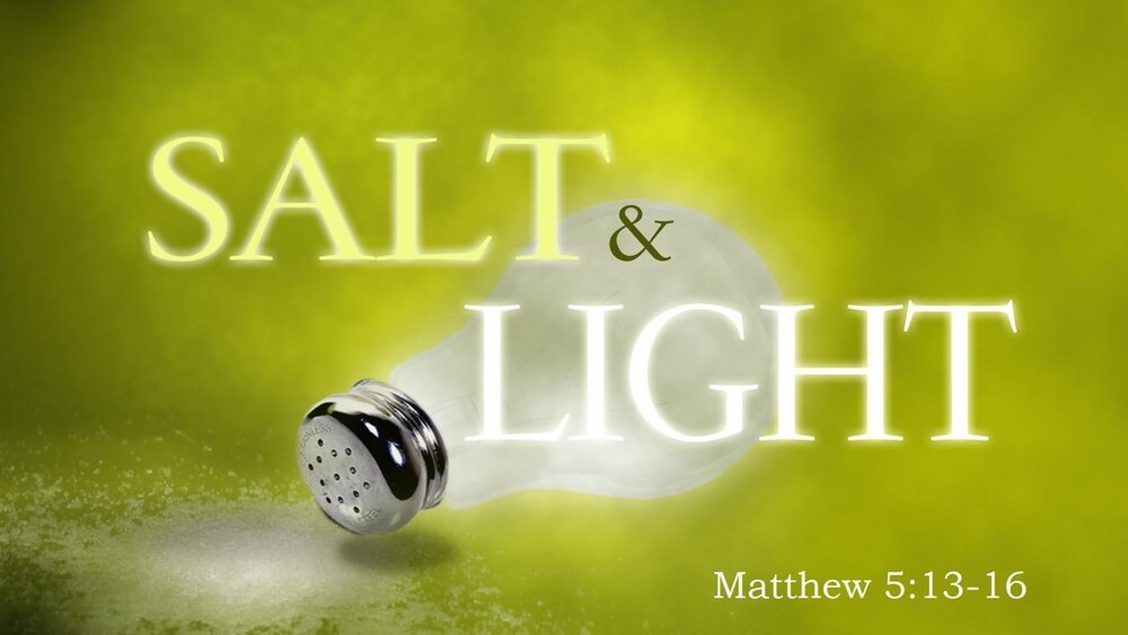Weekly Seed of Faith 3/18/23

“You are the salt of the earth; but if salt has lost its taste, how can its saltiness be restored? It is no longer good for anything, but is thrown out and trampled underfoot.“You are the light of the world. A city built on a hill cannot be hid. No one after lighting a lamp puts it under the bushel basket, but on the lampstand, and it gives light to all in the house. In the same way, let your light shine before others, so that they may see your good works and give glory to your Father in heaven.” Matthew 5:13-16
Dear Faithful Seed-Sowers,
It is my prayer that you are staying healthy and are walking with Jesus as you season your world.
This a two-part message. This week will talk about being a little salty. Next week, we will see how light can shine.
In the days of Jesus, and for many centuries thereafter, salt was the most common preservative used. There were no refrigerators, no deep freezers in ancient times. Salt was used to keep things from going bad and becoming rotten, particularly meat. When Jesus said, “You are the salt of the earth; but if salt has lost its taste, how can its saltiness be restored? It is no longer good for anything, but is thrown out and trampled underfoot” Jesus was telling His disciples that they were called to be the preserving agent in a decaying world.
This simple principle from Jesus is that you and I are called to be a preserving force in our world–wherever we are called to live, work, play and worship.
Think of it this way — salt that never leaves the box on the shelf will do no good in preserving anything. To be effective, salt has to be rubbed into the meat. Have you gone into the grocery store and looked at all of the “rubs” they have for seasoning your steak? In this same way, we must allow God to use us as flavorful seasoning (rub) for our homes, workplaces, neighborhoods, families, and churches. A small amount of love and kindness goes a long way in making our world a better place.
Sodium is an extremely active element found naturally only in combined form; it always links itself to another element. Chlorine, on the other hand, is the poisonous gas that gives bleach its offensive odor. When sodium and chlorine are combined, the result is sodium chloride–common table salt–the substance we use to preserve meat and bring out its flavor.
Love and truth can be like sodium and chlorine. Love without truth is flighty, sometimes blind, willing to combine with various, contrary doctrines. On the other hand, truth by itself can be offensive, sometimes even poisonous. Spoken without love, truth can turn people away from the gospel. But when truth and love are combined in an individual or in a church then we have what Jesus called “the salt of the earth,” and we are able to preserve and bring out the beauty of our faith.
The other day I went to the grocery store to do some shopping. I went to buy juice for home communions, I came across an insight on flavoring. I was holding a bottle of Blueberry Pomegranate Juice. There was a picture of a ripe pomegranate spilling its exotic, glistening seeds onto mounds of fat, perfect blueberries. I read the ingredient list: “Filtered water, pear juice concentrate, apple juice concentrate, grape juice concentrate.” Where was the blueberry? Where was the pomegranate? Finally, I found them, fifth and seventh in a list of nine ingredients.
By law, food ingredients are listed in descending order of weight. Meaning a product contains the greatest proportion of the first ingredient on the list and successively less of those farther down the list. According to the jug in my hand, it contained mostly water—a few other juices, with just enough blueberry and pomegranate for flavor and color.
In the bottom corner of the front label in small, easy-to-miss, were the tell-tale words: “Flavored juice blend with other natural ingredients.” The enticing pictures and clever labeling were decoys used to sell a diluted, blueberry-pomegranate flavored product convincingly disguised to look like something it was not. I put the juice back on the shelf. I chose the juice that was more costly—but it had more of what I was looking for.
So What?
That jug of juice made me think, what if we had an ingredients list printed on us?
Would Jesus be the main ingredient?
If not, how far down the list would He be?
Would our “label” accurately represent our contents?
Or would we falsely project a misleading outward-appearance that cleverly masked our diluted ingredients? Our packaging may be convincing. We may look and sound like the real thing but what if someone came looking for Jesus and found something else?
Oliver Wendell Holmes once said, “I might have entered the ministry if certain clergymen I knew had not looked and acted so much like undertaker.” (Today In The Word, June, 1988, p. 13).
More than a hundred years ago the atheist philosopher Friedrich Nietzsche reproached a group of Christians. Nietzsche said: “Yuck, you make me sick!” When their spokesman asked why, he answered, “because you redeemed don’t look like you are redeemed. You are as fearful, guilt-ridden, anxious confused, and adrift in an alien environment as I am. I am allowed. I do not believe. I have nothing to hope for. But you people claim you have a Savior. Why don’t you look like you are saved?” (Brennan Manning, Souvenirs of Solitude, 2009, Colorado Springs, NavPress)
Every Sunday my loving wife prays for me before church. Every Sunday she concludes with the same prayer, “Lord, help Dave to be funny. Let him reflect the peace and joy he has in knowing you. Amen.” Knowing Jesus really is the best part of my life. And Jesus wants us to be SALT to our world. He wants us to RUB off on others. It only takes a small amount of salt to flavor whatever we are using it on; the same way with us—it only takes a small amount of the love of Jesus to rub off on those in our tiny sector of the world. That’s our job: to be the SALT of the earth.
I leave you with your “SO WHAT?” homework:
- Am I the SALT of the Savior? Divide my life into who I am, what I’m doing, and where I’m going—and let’s spread the love of God everywhere we are.
- What if I had an ingredients list printed on me? Would Jesus be the main ingredient? What do I need to do in order to be more like Christ?
My prayer for you today: Be funny! (Just kidding.) Seriously, let’s take some time to sit with this SEED OF FAITH. Let’s look at our lives. If I’m the SALT of the EARTH, am I RUBBING off on those I live with? work with? worship with? Everywhere I go, am I seasoning others with God’s tremendous love? “Dear Father, I want others to know you and to experience your grace and love and forgiveness. Help me to fill my heart, mind, soul, spirit, body and strength with your living words of life so that I can be a living, walking, talking gospel of Jesus Christ. I don’t want Jesus to be the last ingredient on my label; I want Jesus listed first. Help me to be more like Jesus. Amen.”
See you Sunday!
God loves you and so do I,
Pastor Dave
www,theseedchristianfellowship.com



